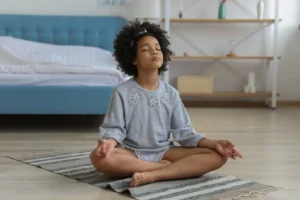On “Because WE matter” a series on Child and Youth Mental Health by Dr. Nneka Orakwue-Ononye, a Child and Youth Psychiatrist, Assistant Clinical Professor at the University of Calgary, Canada.
She said,
I have often been stopped and asked if children suffer from mental health problems. My blunt answer typically is, “Yes, young people do have mental illness!” Most people believe children can take any challenge that comes their way without being able to process or recollect it or without it having a lasting impact on them. Moreover, we exist in a culture that doesn’t acknowledge mental illness, especially among the younger age groups.

We hope to start raising awareness through this platform with the understanding that a child’s physical, mental, or emotional development will have a bearing on what becomes of them in later years. It is vital to know that children are not adults in tiny bodies and do not necessarily have the extent of resilience people assume they have. The brain starts to develop from the womb with complete maturity at about age 25. For these reasons, every young person must get nurtured and guided through the different stages of their development until they reach adulthood.
WHO defines mental health as a state of emotional, psychological and social well-being and not just the absence of a mental disorder. What, then, does this mean? It is the ability to successfully manage life’s complexities, form stable relationships, manage change and cope under diverse conditions. For a child, it is about how they learn, behave and manage daily demands. Their genetic makeup and environment influence the mental health of each individual. This is important in understanding the emotional and behavioral changes that may be evident in young people. Common childhood mental health disorders include Behavioral Disorders, Anxiety Disorders, and Attention Deficit Hyperactivity Disorder. With growing awareness, other neurodevelopmental disorders like Autism Spectrum Disorder are also being identified.

A recent large-scale survey, ‘The Changing Childhood Project‘conducted in 2021 by UNICEF and Gallup, revealed that 1 in 6 Nigerian youth aged 15-24 struggle with a mental health challenge, including feeling depressed, lacking the motivation to do anything, and having anxiety. The study further revealed that Nigerian youth felt the most pressure to succeed globally and were the most concerned about a wide range of things compared to youth from other countries that were included in the study. This has gross implications, as the lack of means to meet these self-imposed, extraordinarily high expectations will have a continuous toll on their mental well-being. These young people face challenges in their immediate environments, including family, school, activities, friendships, and communities.
Every child matters and society must embrace this axiom if our children’s lifetime dreams, aspirations, and potential are to be met. In an environment of pervasive stigma, as in most developing societies, children with “deviant” behaviors and emotional dispositions are “kept in the closet,” meaning that early recognition and primary preventative measures are not effected or successful. This practice not only limits the young person’s potential in life but will also make the full scale of this burden unrecognized by responsible governments and policymakers. Research has shown that early intervention improves the long-term outcome of most mental health disorders. Supports could be in the form of biological and psychological interventions and building solid social supports.

Childhood is not only a finite quality but also a critical period for the emotional framework of the adult it yields to. As a society, we must do all within our means to raise awareness of children’s emotional and behavioral disturbances and destigmatize mental illness in youth. Families, schools, religious organizations, and all other agencies that work with children are encouraged to seek training and support in identifying mental health disorders in young people. Governments must play their part in providing funding and other legal and infrastructural frameworks to support optimum emotional health for young people.
It is the hope that this platform will be one where we can consistently shine the light on the many challenges impacting youth mental health, especially in the developing world. Together we can make a difference and give our children the opportunity to live out their full potential!














